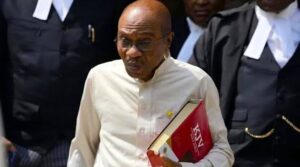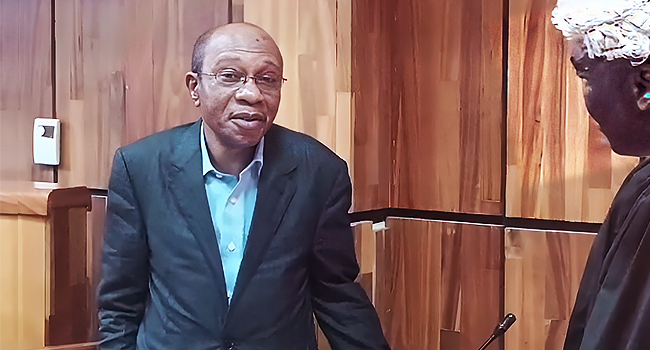In a significant development in the ongoing investigations surrounding the former Governor of the Central Bank of Nigeria (CBN), Godwin Emefiele, the Federal High Court in Lagos has ordered the interim forfeiture of a substantial cash sum of $2.045 million, as well as several valuable properties linked to the embattled former CBN chief. The ruling, delivered by Justice Akintayo Aluko, marks a pivotal moment in the legal proceedings against Emefiele, who has been under intense scrutiny for alleged financial misconduct during his tenure at the apex bank.
The court’s order, which was issued on Thursday, also mandates the interim forfeiture of seven landed properties, all tied to Emefiele. These properties, which are scattered across prime locations in Lagos and Delta State, include two fully detached duplexes situated at No. 17b Hakeem Odumosu Street, Lekki Phase 1, Lagos;
An undeveloped parcel of land measuring 1919.592 square meters on Oyinkan Abayomi Drive (formerly Queens Drive), Ikoyi, Lagos; a bungalow located at No. 65a Oyinkan Abayomi Drive, Ikoyi; a four-bedroom duplex at 12a Probyn Road, Ikoyi; an industrial complex under construction on a 22-plot expanse in Agbor, Delta State; eight units of undetached apartments on a plot measuring 2457.60 square meters at No. 8a Adekunle Lawal Road, Ikoyi; and a full duplex along with its appurtenances on a plot measuring 2217.87 square meters at 2a Bank Road, Ikoyi, Lagos.
In addition to the forfeiture of these properties, the court also ordered the interim forfeiture of two shares of share certificates belonging to Queensdorf Global Fund Limited Trust, a company allegedly connected to Emefiele’s questionable dealings. These shares, along with the cash and properties, are all suspected to be proceeds from unlawful activities.
 The ruling followed an application presented to the court by the Economic and Financial Crimes Commission (EFCC), represented by Senior Advocate of Nigeria (SAN), Rotimi Oyedepo, who led a legal team including Chineye Okezie and Zeenat Atiku-Bala. Oyedepo, in his submission, argued that the money, properties, and other assets in question were reasonably suspected to be linked to illegal activities and therefore should be temporarily forfeited to the Federal Government pending the conclusion of investigations.
The ruling followed an application presented to the court by the Economic and Financial Crimes Commission (EFCC), represented by Senior Advocate of Nigeria (SAN), Rotimi Oyedepo, who led a legal team including Chineye Okezie and Zeenat Atiku-Bala. Oyedepo, in his submission, argued that the money, properties, and other assets in question were reasonably suspected to be linked to illegal activities and therefore should be temporarily forfeited to the Federal Government pending the conclusion of investigations.
Citing several legal provisions, including Section 17 of the Advance Fee Fraud and Other Fraud Related Offences Act No. 14 of 2006, and Section 44 (2)(B) of the 1999 Constitution of the Federal Republic of Nigeria, Oyedepo urged the court to exercise its inherent jurisdiction to grant the forfeiture order. He emphasized that the evidence gathered by the EFCC indicated that the assets were acquired through illicit means, specifically through a scheme involving the former CBN governor and his associates.
Supporting the application was an affidavit deposed by Idi Musa, an EFCC investigator based in the Lagos office. The affidavit detailed the findings of the EFCC’s investigation into what it described as “monumental fraudulent activities” allegedly perpetrated by senior officials of the CBN under Emefiele’s leadership. According to the affidavit, these officials were involved in the fraudulent conversion and transfer of substantial sums of money for personal use, actions that were facilitated by the misuse of their positions within the bank.
Musa’s affidavit further revealed that the investigation had uncovered several properties believed to have been purchased or developed with the proceeds of these unlawful activities. The affidavit specifically mentioned that the properties listed in the court’s order were part of a broader scheme to launder money and conceal the origins of the illicit funds. The affidavit also detailed how these properties were acquired through intermediaries and shell companies set up to obscure the real beneficiaries, with Emefiele being identified as the ultimate owner.
One of the key figures mentioned in the investigation is Ifeanyi Omeke, a Deputy General Manager and Head of Litigation at Zenith Bank Plc, who was reportedly a close associate of Emefiele. The affidavit claims that Omeke played a crucial role in the fraudulent activities, acting as an intermediary for Emefiele by purchasing properties and managing other assets on his behalf. During a search of Omeke’s office at the Zenith Bank Head Office on Ajose Adeogun Street, Victoria Island, Lagos, the EFCC allegedly recovered significant evidence, including the cash sum of $2.045 million and the share certificates that are now subject to forfeiture.
The affidavit also alleged that Omeke was involved in negotiating kickbacks from companies seeking foreign exchange allocations from the CBN, with these illegal payments being funneled into various assets, including the properties now under scrutiny. It was further revealed that these properties were acquired in the names of cooperating entities, a tactic commonly used to launder money and hide the true ownership of assets acquired through illegal means.
The investigation also implicated other associates of Emefiele, including one Olusola Bodunde, who was involved in the acquisition and development of properties in Lagos. The affidavit described how Bodunde, along with another associate, Idowu Sharafa, developed luxury duplexes in Lekki Phase 1, which were later purchased on behalf of Emefiele using funds believed to have been obtained through corrupt practices.
The EFCC’s findings suggest that the properties and other assets now under interim forfeiture were part of a larger scheme orchestrated by Emefiele to siphon off funds from the CBN and invest them in high-value assets across the country. The commission argued that these assets were not purchased with legitimate earnings but were instead acquired using money derived from criminal activities.
After carefully considering the submissions of the EFCC’s counsel and reviewing the extensive documentation provided, Justice Aluko ruled in favor of the commission, granting the interim forfeiture of the money, share certificates, and landed properties. The judge noted that the evidence presented was compelling and that the forfeiture was necessary to prevent the dissipation of the assets while investigations continued.
The court’s ruling is seen as a critical step in the EFCC’s ongoing efforts to hold Emefiele and his associates accountable for their alleged financial crimes. The interim forfeiture ensures that the assets remain under the control of the Federal Government, pending further legal proceedings that will determine whether they will be permanently confiscated.
This case, which has garnered widespread attention, underscores the Nigerian government’s commitment to combating corruption, particularly within its key institutions. As the investigation progresses, it remains to be seen what additional evidence will be uncovered and what the ultimate legal consequences will be for Emefiele and those implicated in the alleged fraud. The interim forfeiture of these assets, however, represents a significant victory for the EFCC and a clear message that those found guilty of financial misconduct will face serious repercussions.




